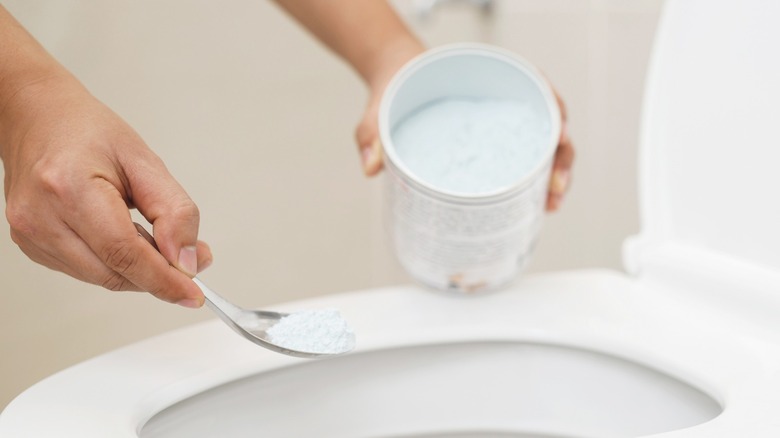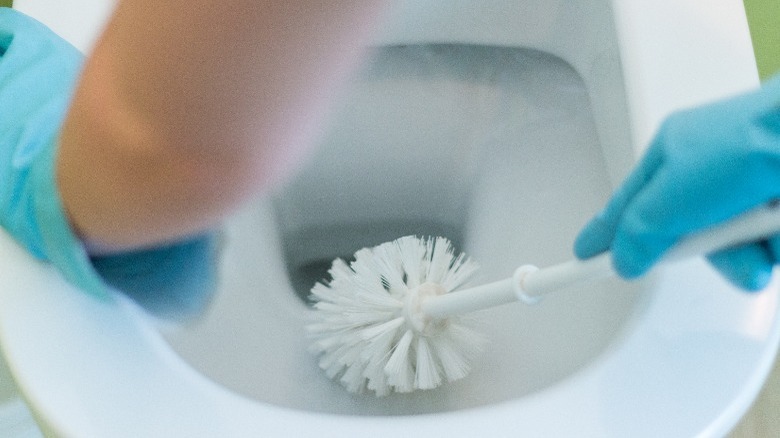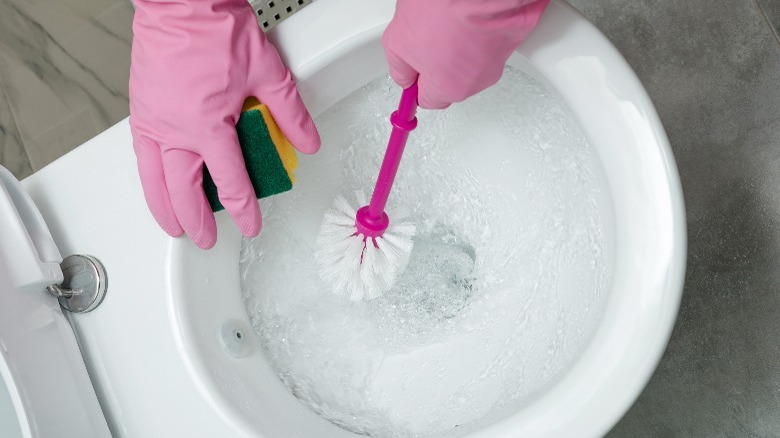Can You Really Use Powdered Laundry Detergent In Place Of Toilet Bowl Cleaner?
If you're cleaning your bathroom and suddenly discover that you're out of toilet cleaner, a TikTok hack that's gaining traction suggests that you can actually use powdered laundry detergent as a substitute.
According to the hack, all you need to do is to pour half a cup of the detergent into the bowl. Spread it evenly around the entire bowl instead of dumping it all at the center. For better detergent adherence, it's helpful to flush the toilet first or pour some water into the bowl before adding the detergent. Allow the detergent to sit for about 15 to 20 minutes, giving it time to work effectively. After the wait, use your toilet brush to scrub the bowl thoroughly, then flush. This method is said to help tackle the grime and scales in the toilet bowl efficiently.
While many users attest that pouring laundry detergent on their toilet bowls does a great job at getting the gunk off, several users warn that laundry detergents, particularly powder detergents, are more likely to clog pipes — hence the industry shift toward liquid detergents for washing machines. Moreover, users warn that this cleaning "hack" isn't recommended for those with septic tanks.
Why laundry detergents make excellent toilet bowl cleaner alternatives
So why do we say that laundry detergents can be a strong substitute for toilet bowl cleaners when you're in a pinch? Well, they contain similar cleaning ingredients. While laundry detergents don't contain strong cleaners like hydrochloric acid and bleach, they have milder cleaning agents. For example, many laundry detergents contain citric acid. Citric acid can help you get rid of calcium deposits, limescale, and urine scales without being too harsh on the toilet bowl. As a bonus, citric acid can whiten your toilet in no time!
Additionally, many laundry detergents contain chlorine-free bleaches like sodium percarbonate and sodium perborate. These are stable forms of hydrogen peroxide. These ingredients are inactive as solids and only release hydrogen peroxide when water is added to them. Do you know what happens when you pour hydrogen peroxide into your toilet? Its disinfecting properties get rid of germs, dirt, and grime.
Detergents also contain other helpful ingredients. Builders in laundry detergents, aka chelating agents, soften hard water. Similar to toilet cleaners, laundry detergents also contain surfactants. These cleaning agents help bond the grease and dirt with water to help loosen them, break them up, and wash them away. Laundry detergents also contain enzymes that help break down stains from proteins, starch, cellulose, and fats.
Why laundry detergents aren't ideal toilet cleaners
As mentioned above, many cautious users warn against using laundry detergent on toilet bowls, citing potential risks of pipe clogging. This is because powder detergents contain filler ingredients that may not completely dissolve, especially since the hack recommends people pour half a cup into a toilet bowl.
Homeowners and plumbers also warn against using this hack especially for people with septic systems. There are several reasons why. First, laundry detergents contain phosphates, which help to soften water, fight limescale, and get rid of stains. Phosphates have a number of ecological drawbacks, though, and could also promote bacteria and algae growth in your septic systems. This can potentially lead to clogs and backups. Second, if you're using a high-sudsing detergent, it can create too much foam and clog your septic system. Lastly, it contains enzymes.
Some of the benefits of detergents are equally detrimental. As mentioned above, enzymes found in laundry detergents make them great for breaking down proteins. This means that they may also break down the good bacteria that help break down the tank's waste. Some of that damage can be mitigated, though, if you opt for an environmentally friendly, biodegradable detergent.


